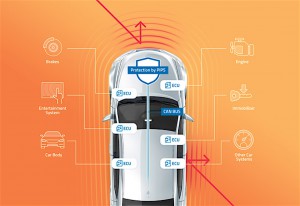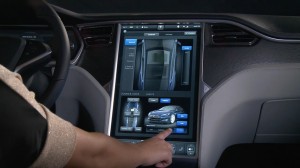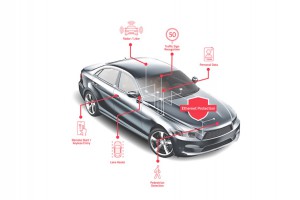
NNG and its Arilou cyber security division have developed an effective system to prevent cyber attacks on cars.
In an age where Facebook profits from pirated information and ransomware is the new form burglary where the thieves don’t even need to climb fences, stand on a roof or pry open a window, cyber security is a major topic of discussion.
After years of minimizing the threat, carmakers have been forced to adjust their thinking and take the threat much more seriously. But effective solutions are still under development and a network of suppliers with solutions is only beginning to emerge.
However, NNG, an Israeli company based in Hungary known in the automotive business for its work in navigation systems, has come up with what it believes is an effective solution, according to David Wiernik, founder and president of NNG. The system has already gotten perfect marks in independent tests conducted the University of Michigan Transportation Research Institute.
NNG branched out into cyber security last year by acquiring a 60% stake in an Israeli start-up firm called Arilou, which was founded by veterans of the Israeli Defense Forces’ highly regarded cyber security unit.
(Demand for cyber security experts in auto industry soars. Click Here for the story.)

Automakers, like Tesla, are searching for more advanced cyber security technology to help keep vehicles and occupants safe.
“I asked my son who was in the same unit, ‘Who was the best’ and about a week later he came back to me and said Arilou, said Wiernik, whose privately held firm now owns 100% of the cyber security company and has quickly expanded its capabilities.
“In the automotive industry, cyber security (of cars) has become critical. As soon as they become compromised they become a time bomb,” he said. Carmakers have built up their in-house expertise on cyber security, Wiernik said. “The in-house solution are far from perfect,” he noted.
Praveen Chandrasekar, an analyst with Frost & Sullivan, the consulting firm that studies trends in the electronics and computer industries, observed that car makers are looking at collaboration with suppliers and firms with special expertise as one possible solution to threat. But the response is still fragmented.
Ziv Levi, founder and CEO of Arilou, noted as vehicles have become increasingly computerized, Electronic Control Units handle the functionality. In addition, today’s vehicles are also connected to their surroundings through various interfaces.
Some are wireless, such as cellular, Bluetooth, WiFi, and TPMS, and others are wired, such as OBD-II. All this means improved functionality, but it also exposes the vehicles to cyber security threats. Just like any other connected computerized system.
(Click Here to see how Hyundai closes a potential opening for hackers.)
Arilou’s Parallel Intrusion Prevention System, or PIPS, is the first solution on the market that protects the entire vehicle network from a single point. The technology analyzes every message sent on the bus in real time utilizing biometrics, like source detection capabilities with Deep Packet Inspection. PIPS intercepts fake messages originated by a hijacked ECU and can even prevent sending authorized messages from an unauthorized ECU.
One of the system’s greatest strengths is that it can fend off an attack instantly without disrupting any of the vehicle’s systems. The system intercepts the rogue message even before it is complete, he said.
Levi said it also said the protection can be configured to limit its costs and satisfy the industry’s stringent cost controls.
Wiernik, who has several different companies that he started in his portfolio. launched NNG predecessor in 2004 because of the growing interest in navigation guides for use on mobile phones.
He later moved his original company to Budapest to link up with Hungarian company that had developed impressive set of graphics for gaming devices and decided to concentrate on the auto industry and won a demonstration contract with Toyota in 2010 that ultimately led to virtually every other carmaker in the world utilizing its navigation software.
(For more about new legislation attacking cyber security, Click Here.)
It now has offices around the world and more than 1,000 engineers in Budapest working on new software. NNG opened an office in Birmingham, Michigan, in 2015 to serve as the base for customer service to the auto industry in North America.

